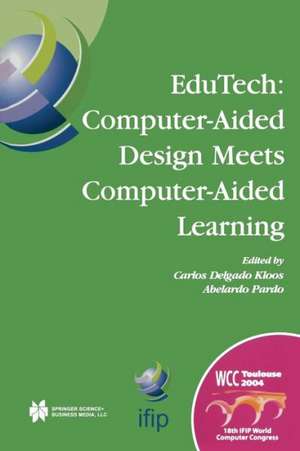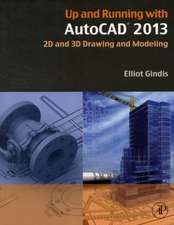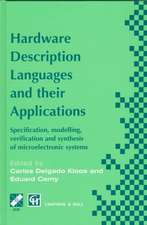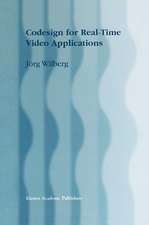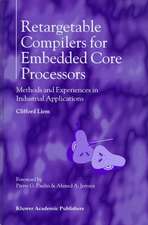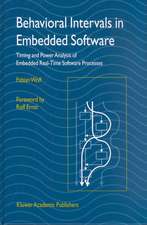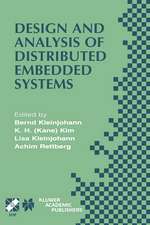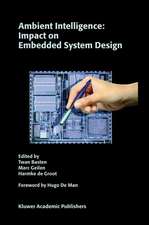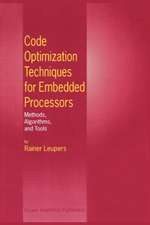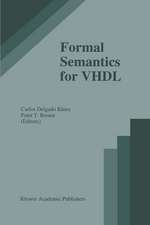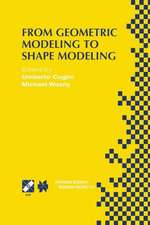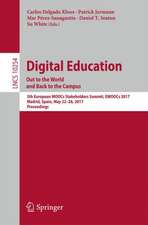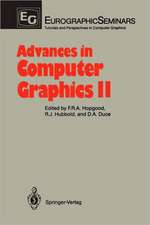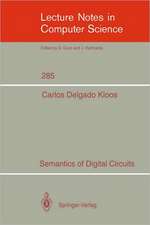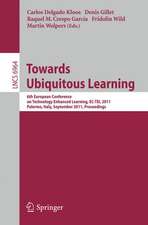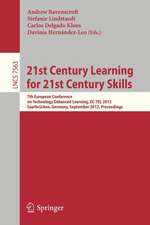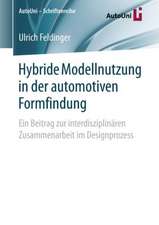EduTech: Computer-Aided Design Meets Computer-Aided Learning: Computer-Aided Design Meets Computer-Aided Learning: IFIP Advances in Information and Communication Technology, cartea 151
Editat de Carlos Delgado Kloos, Abelardo Pardoen Limba Engleză Paperback – 26 apr 2013
EduTech: Computer-Aided Design Meets Computer-Aided Learning contains the proceedings of the EduTech2004 workshop, which was held in August 2004 in conjunction with the 18th IFIP World Computer Congress in Toulouse, France, and sponsored by the International Federation for Information Processing (IFIP). Organized by IFIP WG 10.5 (Design and Engineering of Electronic Systems) in cooperation with IFIP WG 3.6 (Distance Education), the workshop proceedings explore the interrelationship between these two subjects, where computer-aided design meets computer-aided learning. The book includes papers related to eLearning in the area of electronic CAD, but also includes contributions tackling general issues of eLearning that are applicable to this and many other areas such as reusability, standards, open source tools or mobility.
This book will be of value to those interested in the latest developments in eLearning in general, and also to those coming from the electronic design field who want to know how to apply these developments in their area.
Din seria IFIP Advances in Information and Communication Technology
- 20%
 Preț: 170.51 lei
Preț: 170.51 lei - 20%
 Preț: 615.74 lei
Preț: 615.74 lei - 20%
 Preț: 340.32 lei
Preț: 340.32 lei -
 Preț: 397.38 lei
Preț: 397.38 lei - 20%
 Preț: 336.02 lei
Preț: 336.02 lei - 20%
 Preț: 340.98 lei
Preț: 340.98 lei - 20%
 Preț: 503.41 lei
Preț: 503.41 lei - 17%
 Preț: 523.40 lei
Preț: 523.40 lei - 20%
 Preț: 502.06 lei
Preț: 502.06 lei - 17%
 Preț: 488.96 lei
Preț: 488.96 lei - 20%
 Preț: 501.04 lei
Preț: 501.04 lei - 20%
 Preț: 403.20 lei
Preț: 403.20 lei - 15%
 Preț: 708.83 lei
Preț: 708.83 lei - 20%
 Preț: 1162.12 lei
Preț: 1162.12 lei - 20%
 Preț: 1288.25 lei
Preț: 1288.25 lei - 18%
 Preț: 1227.21 lei
Preț: 1227.21 lei - 20%
 Preț: 1282.00 lei
Preț: 1282.00 lei - 18%
 Preț: 1224.18 lei
Preț: 1224.18 lei - 18%
 Preț: 953.03 lei
Preț: 953.03 lei - 18%
 Preț: 953.20 lei
Preț: 953.20 lei - 18%
 Preț: 944.99 lei
Preț: 944.99 lei - 18%
 Preț: 948.29 lei
Preț: 948.29 lei - 15%
 Preț: 645.47 lei
Preț: 645.47 lei - 18%
 Preț: 960.13 lei
Preț: 960.13 lei - 20%
 Preț: 1288.11 lei
Preț: 1288.11 lei - 20%
 Preț: 998.70 lei
Preț: 998.70 lei - 18%
 Preț: 949.23 lei
Preț: 949.23 lei - 20%
 Preț: 1283.81 lei
Preț: 1283.81 lei - 20%
 Preț: 995.89 lei
Preț: 995.89 lei - 15%
 Preț: 645.79 lei
Preț: 645.79 lei - 20%
 Preț: 1276.74 lei
Preț: 1276.74 lei - 20%
 Preț: 1922.99 lei
Preț: 1922.99 lei - 20%
 Preț: 1285.97 lei
Preț: 1285.97 lei - 18%
 Preț: 956.69 lei
Preț: 956.69 lei - 18%
 Preț: 946.72 lei
Preț: 946.72 lei - 18%
 Preț: 1224.36 lei
Preț: 1224.36 lei - 20%
 Preț: 1277.89 lei
Preț: 1277.89 lei - 18%
 Preț: 953.03 lei
Preț: 953.03 lei - 18%
 Preț: 947.98 lei
Preț: 947.98 lei - 20%
 Preț: 1292.54 lei
Preț: 1292.54 lei - 18%
 Preț: 956.18 lei
Preț: 956.18 lei - 20%
 Preț: 645.79 lei
Preț: 645.79 lei - 18%
 Preț: 1235.25 lei
Preț: 1235.25 lei - 20%
 Preț: 1284.47 lei
Preț: 1284.47 lei - 18%
 Preț: 1231.01 lei
Preț: 1231.01 lei - 20%
 Preț: 993.09 lei
Preț: 993.09 lei - 20%
 Preț: 1288.94 lei
Preț: 1288.94 lei - 20%
 Preț: 987.17 lei
Preț: 987.17 lei - 18%
 Preț: 1833.33 lei
Preț: 1833.33 lei
Preț: 329.76 lei
Preț vechi: 412.21 lei
-20% Nou
Puncte Express: 495
Preț estimativ în valută:
63.12€ • 65.04$ • 53.29£
63.12€ • 65.04$ • 53.29£
Carte tipărită la comandă
Livrare economică 03-17 martie
Preluare comenzi: 021 569.72.76
Specificații
ISBN-13: 9781475779776
ISBN-10: 1475779771
Pagini: 244
Ilustrații: XVI, 227 p.
Dimensiuni: 155 x 235 x 13 mm
Greutate: 0.35 kg
Ediția:Softcover reprint of the original 1st ed. 2004
Editura: Springer Us
Colecția Springer
Seria IFIP Advances in Information and Communication Technology
Locul publicării:New York, NY, United States
ISBN-10: 1475779771
Pagini: 244
Ilustrații: XVI, 227 p.
Dimensiuni: 155 x 235 x 13 mm
Greutate: 0.35 kg
Ediția:Softcover reprint of the original 1st ed. 2004
Editura: Springer Us
Colecția Springer
Seria IFIP Advances in Information and Communication Technology
Locul publicării:New York, NY, United States
Public țintă
ResearchCuprins
Invited Contributions.- Open Source Approaches to Eductional Technology Innovation.- Towards Ambient Schooling.- Can Learning Objects Be Reused - And How?.- E-Learning Standards.- Towards an Enhanced Learning Design Language.- A Type-Based Taxonomy of Items in Assessments.- Use of Standards in a Technical Setting.- Implications of Learning Technology Standardization in Electronic Design.- Review of Standards and Standardisation Activities.- Requirements for Computer-Aided Learning from the Point of View of Electronic Design.- Learning Technology Standardization in Europe.- E-Learning in System Design.- Optimiller: An Interactive Environment that Helps Students in the Understanding, Design and Optimization of Miller Electronic Oscillator Circuits for QCM Sensors.- Educational Tools for Industrial Communication Networks Design.- Remote System of Design and Test of DC-DC Converters.- Mobile E-Learning.- An Open Abstract Framework for Modeling Interoperability of Mobile Learning Services.- Development of E-Learning Tools.- Virtual Community in the Classroom: An Innovating Tool for Elearning.- The E-Learning Grid: Peer-To-Peer Approach.- An Intelligent Virtual Environment for Distance Learning.- Development and Implementation of a Biometric Verification System for E-Learning Platforms.- A Testing Methodology for an Open Software E-Learning Platform.- E-Learning Experience.- Learning Objects Definition and Use in .- E-Learning Engineering: Recommendations for Consumer-Driven Blended Learning.- Impact of Technology on E-Learning.- Impact of Technology on Learning Paradigms and Teaching Practices.- E-Learning Issues for Advanced Technical Topics.- Telecad Course Online and Evaluation Procedure.- Weblabs: A Virtual Laboratory for Collaborative E-Learning.- Building the E-Learning Environment.
Textul de pe ultima copertă
EduTech: Computer-Aided Design Meets Computer-Aided Learning
Edited by Carlos Delgado Kloos and Abelardo Pardo
Computation and communication technologies underpin work and development in many different areas. Among them, Computer-Aided Design of electronic systems and eLearning technologies are two areas which, though different, in fact share many concerns. The design of CAD and eLearning systems already touches on a number of parallels, such as system interoperability, user interfaces, standardisation, XML-based formats, reusability aspects, etc. Furthermore, the teaching of Design Automation tools and methods is particularly amenable to a distant or blended learning setting, and implies the interconnection of typical CAD tools, such as simulators or synthesis tools, with eLearning tools. There are many other aspects in which synergy can be found when using eLearning technology for teaching and learning technology.
EduTech: Computer-Aided Design Meets Computer-Aided Learning contains the proceedings of the EduTech2004 workshop, which was held in August 2004 in conjunction with the 18th IFIP World Computer Congress in Toulouse, France, and sponsored by the International Federation for Information Processing (IFIP). Organized by IFIP WG 10.5 (Design and Engineering of Electronic Systems) in cooperation with IFIP WG 3.6 (Distance Education), the workshop proceedings explore the interrelationship between these two subjects, where computer-aided design meets computer-aided learning. The book includes papers related to eLearning in the area of electronic CAD, but also includes contributions tackling general issues of eLearning that are applicable to this and many other areas such as reusability, standards, open source tools or mobility.
This book will be of value to those interested in the latest developments in eLearning in general, and also to those coming from the electronic design field who want to know how to apply these developments in their area.
Edited by Carlos Delgado Kloos and Abelardo Pardo
Computation and communication technologies underpin work and development in many different areas. Among them, Computer-Aided Design of electronic systems and eLearning technologies are two areas which, though different, in fact share many concerns. The design of CAD and eLearning systems already touches on a number of parallels, such as system interoperability, user interfaces, standardisation, XML-based formats, reusability aspects, etc. Furthermore, the teaching of Design Automation tools and methods is particularly amenable to a distant or blended learning setting, and implies the interconnection of typical CAD tools, such as simulators or synthesis tools, with eLearning tools. There are many other aspects in which synergy can be found when using eLearning technology for teaching and learning technology.
EduTech: Computer-Aided Design Meets Computer-Aided Learning contains the proceedings of the EduTech2004 workshop, which was held in August 2004 in conjunction with the 18th IFIP World Computer Congress in Toulouse, France, and sponsored by the International Federation for Information Processing (IFIP). Organized by IFIP WG 10.5 (Design and Engineering of Electronic Systems) in cooperation with IFIP WG 3.6 (Distance Education), the workshop proceedings explore the interrelationship between these two subjects, where computer-aided design meets computer-aided learning. The book includes papers related to eLearning in the area of electronic CAD, but also includes contributions tackling general issues of eLearning that are applicable to this and many other areas such as reusability, standards, open source tools or mobility.
This book will be of value to those interested in the latest developments in eLearning in general, and also to those coming from the electronic design field who want to know how to apply these developments in their area.
